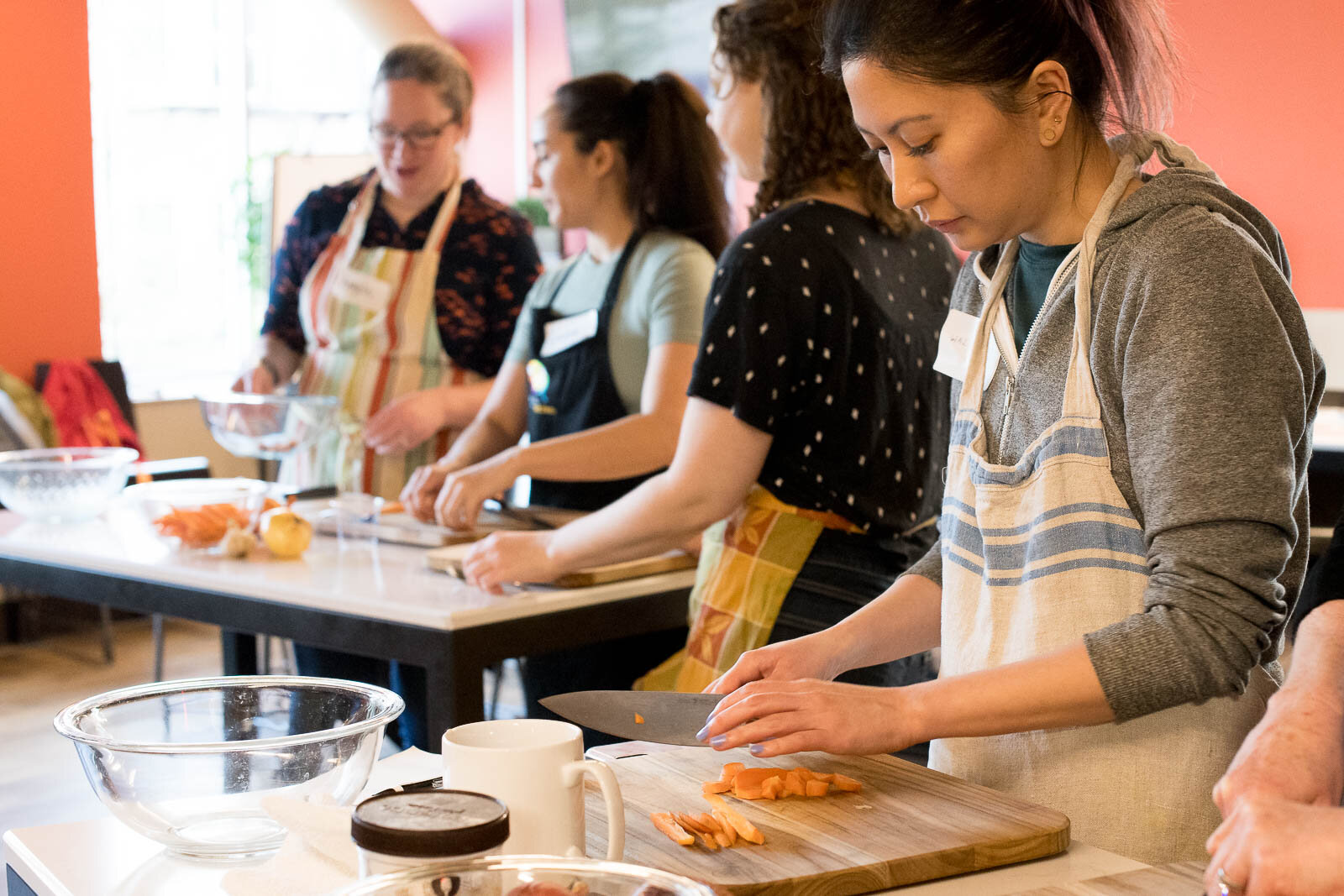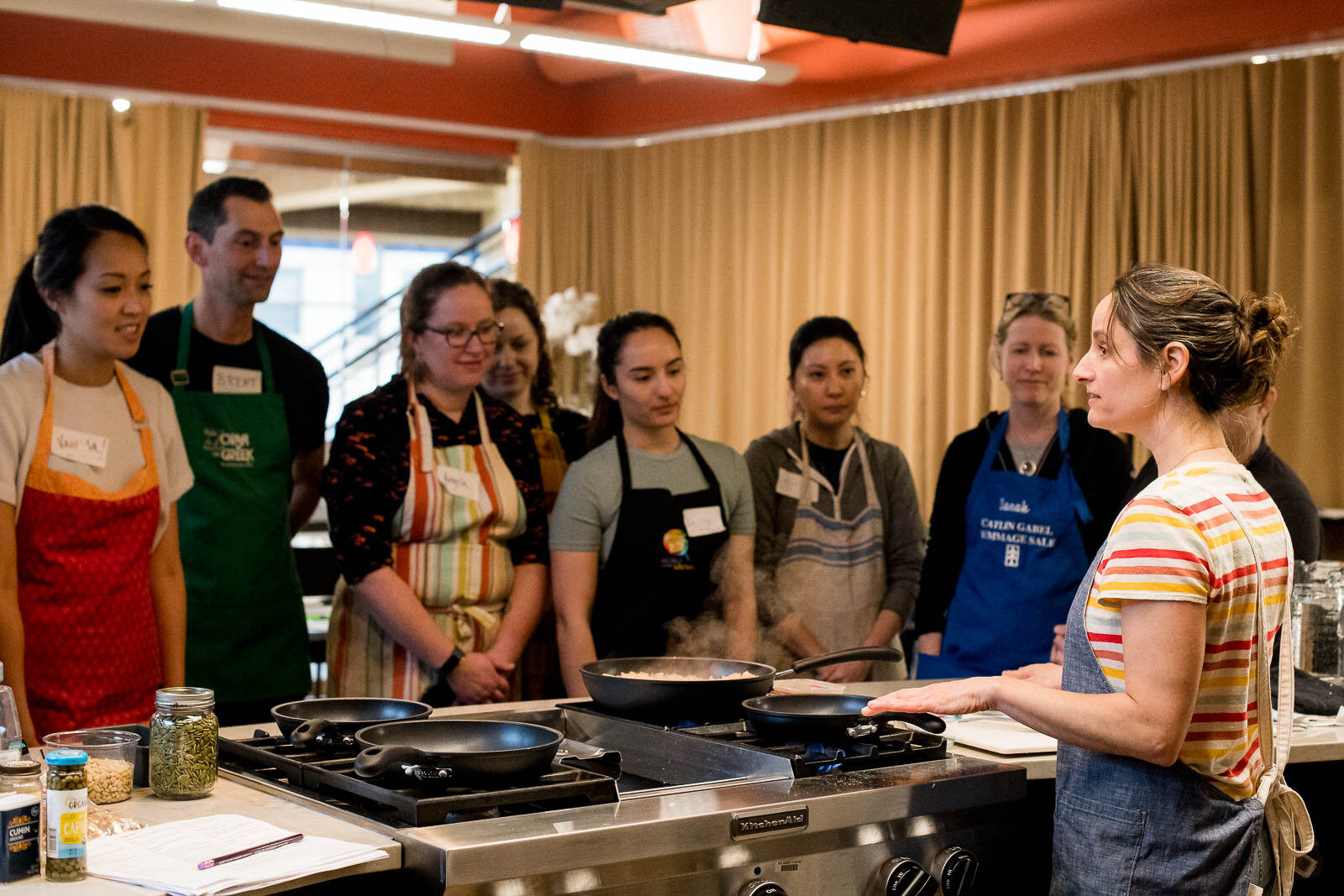You want to provide a fun, life enriching activity that packs a punch - sustainability, wellness, team building, and employee appreciation.
You know that good food brings people together but don't want to schedule another team lunch or happy hour.
Productivity has shifted and you have to innovate to keep the team engaged and efficient.
You realize that the health benefits you offer have to extend beyond health insurance and passive efforts.
You are aware of the buzz around plant-forward eating and its benefits for people and planet and wonder if this could be a great way for your team to learn about it - and to fuel them.
Your company culture has become more important than ever, with employer competition expanding worldwide.
You are not alone!
“Thank you for doing these sessions with our Tillamook County Creamery Association team members. It gives us time to show Genuine Care in how we feed ourselves. This also allowed us to focus on our well-being together and learn some great new recipes.”
Employers are having to up the ante on the activities they provide because data shows that employees are increasingly disengaged and unfocused. Employers want engaged, healthy, happy workers first and foremost for their well-being, and as a bonus, because it leads to increased profits and productivity.
Why Plants?
Plant-forward education in the workplace can be a cost-effective way to promote the health and wellness of your employees and climate health while also improving the company's bottom line.
Reduced healthcare costs: A diet that is rich in plant-based foods has been proven to prevent and reverse chronic diseases such as heart disease and type 2 diabetes, which are among the most expensive medical conditions for healthcare payers. US employers’ health care costs have increased by 47% in the past ten years and are typically the second-highest employer expense after wages and benefits. Estimated healthcare costs due to preventable conditions was $730.4 billion in the US in 2016. By encouraging employees to consume more plant-based foods, employers may be able to reduce their healthcare costs by lowering the number of claims related to chronic diseases.
Reduced absenteeism: According to the Society for HR Management, the average cost per employee per sick day in 2020 was $226. When employees miss work, productivity can suffer and it can be costly to pay for temporary replacements or to catch up on missed work. A healthier diet can help reduce the number of sick days employees take, which can reduce absenteeism costs for employers.
Increased productivity: A diet that is high in plant-based foods can improve energy levels, mental clarity, and overall health, which can lead to increased productivity, decreased burnout, and a positive impact on the bottom line. Eating a healthy diet can support stress management and improve mood, which can also lead to increased productivity and job satisfaction. No more paying for eight hours of work when the afternoon slump eats up four hours!
(Plus, plant foods are gorgeous and tasty - when you know how to prepare them! And the evidence is clear how eating more plants impacts planetary health. “Food is the single strongest lever to optimize human health and environmental sustainability on Earth.” - EAT-Lancet Commission)
Trust me! I have been doing this for 25 years.
I have demystified plant-forward eating to students of all ages, skill levels, and dietary preferences at dozens of nonprofits, workplaces, schools and hospitals. I love helping leaders empower their employees to make sustainable improvements to their diet so they are healthy and feel good - and in turn are more productive and take fewer sick days.
Class Topics Examples
Easy Weeknight Meals
1 Hour of Prep; Lunches all Week
Flavor Boosts: Sauces + Dressings
Pantry Upgrade
Healthier Snacks + Sweets
Omnivores, vegetarians, vegans welcome! This is for anyone who wants to up their game in the kitchen and eat more plants. These experiences increase confidence and skills preparing plant-forward meals so they can seamlessly integrate more plants into their diet for meals and years to come. They’ll learn it is possible to prepare delicious healthy food without spending a lot of time and money.
Choose in person or virtual; quarterly/seasonally, monthly, or à la carte.
Please fill out the form below and Lauren will be in touch.
“This was my favorite wellness event because I learned so many things that I’ll use right away!”
“It was so much fun and the best hour of my week! Blessed to work for a company that cares and organizes these types of events.”
““This would be a great addition to any corporate or union wellness program. Lauren is creative, relatable and flexible, making it possible for her to reach groups and individuals who wouldn’t normally seek out plant-forward cooking classes. ”
“I’ve been watching a variety of cooking videos on YouTube but your class had a different vibe (more intimate, personal) and I appreciated the ability to ask questions and get specific tips.”
“I never thought about a time in my life that cooking skills would be so important to my health, and my ability to balance my budget. I use these cooking skills weekly if not daily!”
“It was so special to enjoy our cakes together on our video call later that evening. Really made it feel like we were around the same table enjoying the same dish!”
— Virtual cook-along participant
“Several clients adopted diet changes because of her classes and have seen immediate results! Not only was the class informative and fun, it was also grounded in principles of justice, equity, and inclusion.”
— HIV Services Coordinator, Ecumenical Ministries of Oregon
“I absolutely loved what we prepared and enjoyed some new tastes that I otherwise wouldn’t have experienced. ”
— Participant from Nike
“My passion for food grew immensely and I walked away knowing so many more skills than I could have imagined. ”
— NUNM Graduate Student
FAQ’s
How will it work at my location if we don’t have a kitchen you can use?
No problem! As long as there’s a sink, two tables, and an electrical outlet nearby (unless the recipes don’t require electricity), we’re good.
Do you do cooking experiences for groups of clients, like instead of going golfing?
Absolutely! It’s a really fun way to switch it up.Can we do a virtual activity if we have employees in multiple time zones?
Yep.Will all of the food be vegan?
It can be but doesn’t have to be! We’ll come up with the menu together so that everyone is accommodated.What exactly is “plant-forward”?
A style of cooking and eating that emphasizes and celebrates, but is not limited to, plant-based foods - including fruits and vegetables (produce); whole grains; beans, other legumes (pulses) and soy foods; nuts and seeds; plant oils; and herbs and spices - and that reflects evidence-based principles of health and sustainability.Source: Menus of Change, a joint initiative of Harvard T.H. Chan School of Public Health Department of Nutrition and the Culinary Institute of America.

















